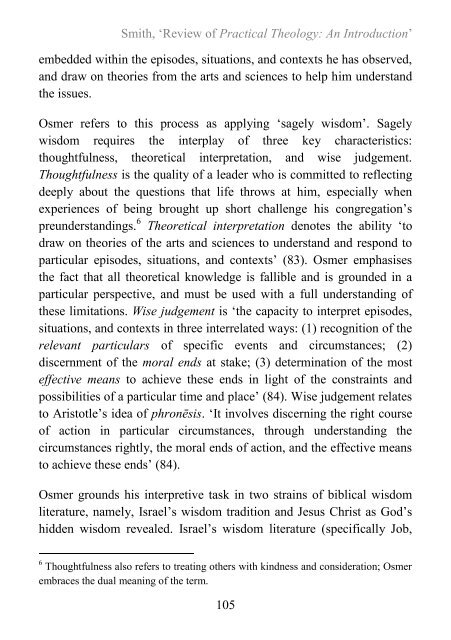Conspectus, vol. 10.pdf - South African Theological Seminary
Conspectus, vol. 10.pdf - South African Theological Seminary
Conspectus, vol. 10.pdf - South African Theological Seminary
Create successful ePaper yourself
Turn your PDF publications into a flip-book with our unique Google optimized e-Paper software.
Smith, ‘Review of Practical Theology: An Introduction’<br />
embedded within the episodes, situations, and contexts he has observed,<br />
and draw on theories from the arts and sciences to help him understand<br />
the issues.<br />
Osmer refers to this process as applying ‘sagely wisdom’. Sagely<br />
wisdom requires the interplay of three key characteristics:<br />
thoughtfulness, theoretical interpretation, and wise judgement.<br />
Thoughtfulness is the quality of a leader who is committed to reflecting<br />
deeply about the questions that life throws at him, especially when<br />
experiences of being brought up short challenge his congregation’s<br />
preunderstandings. 6 Theoretical interpretation denotes the ability ‘to<br />
draw on theories of the arts and sciences to understand and respond to<br />
particular episodes, situations, and contexts’ (83). Osmer emphasises<br />
the fact that all theoretical knowledge is fallible and is grounded in a<br />
particular perspective, and must be used with a full understanding of<br />
these limitations. Wise judgement is ‘the capacity to interpret episodes,<br />
situations, and contexts in three interrelated ways: (1) recognition of the<br />
relevant particulars of specific events and circumstances; (2)<br />
discernment of the moral ends at stake; (3) determination of the most<br />
effective means to achieve these ends in light of the constraints and<br />
possibilities of a particular time and place’ (84). Wise judgement relates<br />
to Aristotle’s idea of phronēsis. ‘It in<strong>vol</strong>ves discerning the right course<br />
of action in particular circumstances, through understanding the<br />
circumstances rightly, the moral ends of action, and the effective means<br />
to achieve these ends’ (84).<br />
Osmer grounds his interpretive task in two strains of biblical wisdom<br />
literature, namely, Israel’s wisdom tradition and Jesus Christ as God’s<br />
hidden wisdom revealed. Israel’s wisdom literature (specifically Job,<br />
6 Thoughtfulness also refers to treating others with kindness and consideration; Osmer<br />
embraces the dual meaning of the term.<br />
105

















